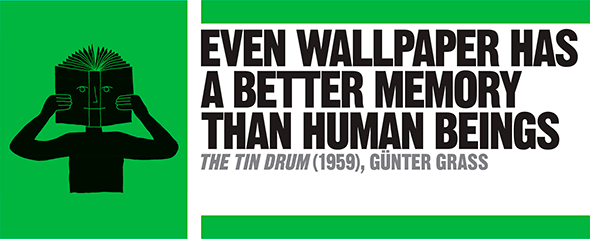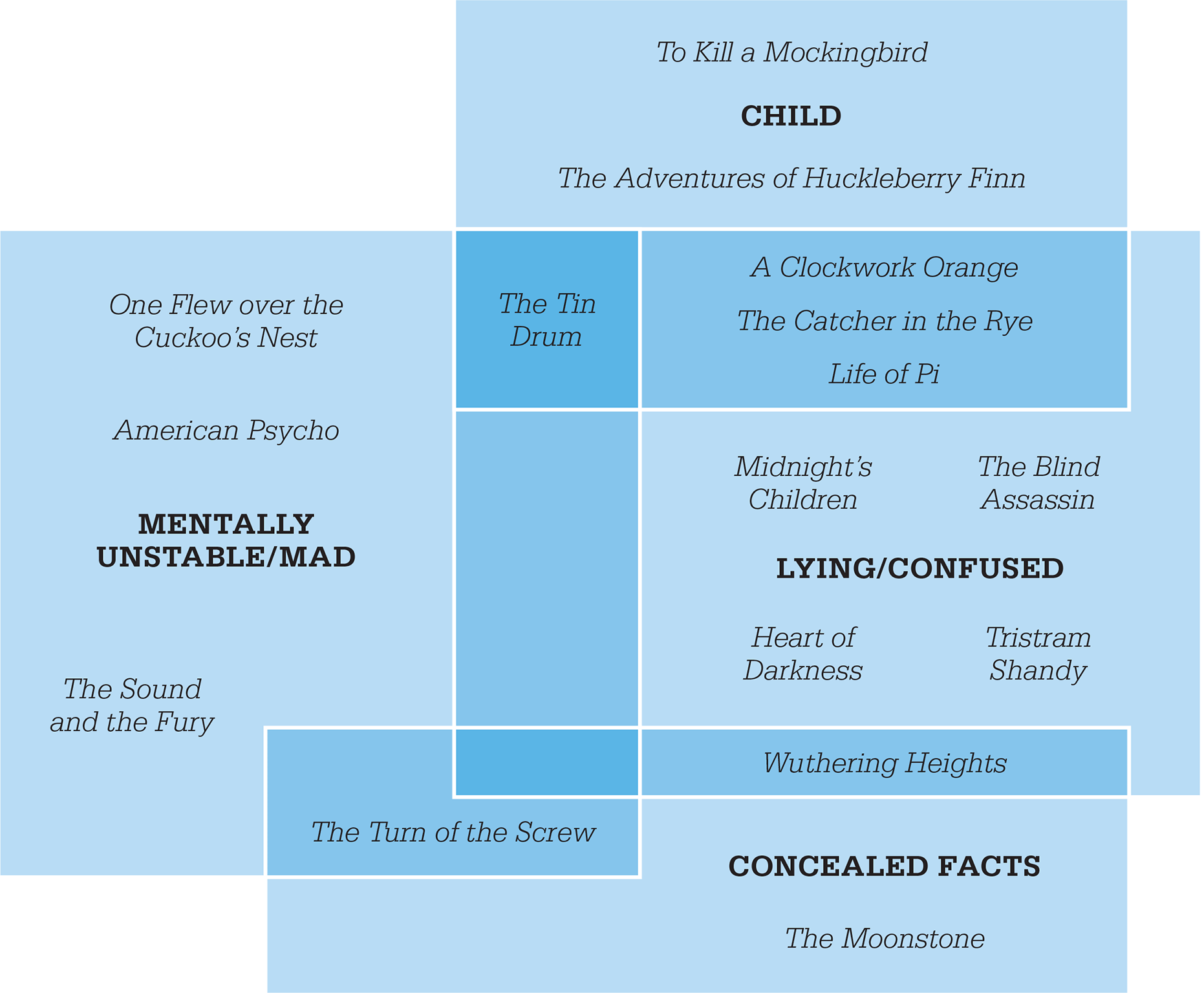The Literature Book (Big Ideas Simply Explained) (2016)


IN CONTEXT
FOCUS
The unreliable narrator
BEFORE
1884 The naive boy hero in Mark Twain’s The Adventures of Huckleberry Finn fails to understand the significance of events that is clear to readers.
1955 Humbert Humbert’s narrative is assembled from notes made in an asylum and presented after his death in Vladimir Nabokov’s Lolita.
AFTER
1962 Delinquent teenager Alex confesses all in “Nadsat”, a futuristic teen-speak, in Anthony Burgess’s novel A Clockwork Orange.
1991 Bret Easton Ellis’s serial killer speaks through a yuppie archetype in American Psycho.
2001 Yann Martel’s narrator stretches credulity in Life of Pi, with his tale of life adrift with a tiger - and then offers a different option.
The term “unreliable narrator” refers to first-person narrators who undermine the authority of their own stories. Realist novels tend to offer a rational speaking voice telling a story that meets a reader’s expectations. But what if the narrator gives the reader reason to doubt, because he or she is insane, or has a distorted perception of the world, or is very young, or lying?
Texts of the 20th century are littered with slippery speakers, from Humbert Humbert in Vladimir Nabokov’s novel Lolita to Patrick Bateman in Bret Easton Ellis’s American Psycho. But unreliable narrators have been around for centuries, and include Jonathan Swift’s naive Gulliver and Mark Twain’s ingenuous Huckleberry Finn. Executed well, novels with unreliable narrators engage the reader differently: that element of doubt both stretches credulity and draws the reader in.
In the midst of history
Günter Grass has been described as “the conscience of a nation” for his darkly satirical portrait of the rise of Nazi sympathies in ordinary families and the aftermath of the war in The Tin Drum. Anyone seeking an example of an unreliable narrator need look no further than the stunted hero of the novel, Oskar Matzerath. Oskar introduces himself from his bed in a “mental hospital” where he has been held following his trial for murder. He explains that until the age of 20 he was just three feet tall, having arrested his own growth on his third birthday by sheer force of will.
History is happening all around, but the spotlight focuses on the fierce, tiny figure of Oskar, with his constant companion - a tin drum - and a scream that can break glass. He has two possible fathers: his mother’s lover, or her husband, who runs a grocery store in the Free City of Danzig (now Gdansk, Poland), which is under German control. Oskar is a witness to real events in history in Danzig and Düsseldorf but, obsessed with his own needs, he is no hero. Over the years he is implicated in a string of deaths.
"… I stuck to my drum and didn’t grow a finger’s breadth from my third birthday on."
The Tin Drum
Unlikely truths
Sometimes the narration slips into the third person, or is passed to Oskar’s jailer to allow another perspective. The tone varies: a slaughter of nuns on a Normandy beach is scripted like a drawing-room farce, while Oskar’s poetic voice both enchants and revolts as he describes a fisherman hauling up a horse’s head writhing with eels. He diverts us down the blind alleys of his obsessions with art, circus dwarfs, nurses, and the scents of women he seduces. He offers a rational history of Danzig, then conjures up a nightclub called the Onion Cellar where people chop raw onions to make themselves cry.
What does Oskar represent? Perhaps he is the devil, using his scream to cut holes in shop windows to tempt passers-by to steal, or seducing women by ingenious means. Or perhaps he embodies Grass’s perception of Germany - immune to suffering during Nazism and quick to bury the past. What is certain, however, is that through Oskar’s grim magical fantasy the author found a way to drum history into memory.

Unreliable narrators come in different guises: some are liars or conceal facts, others are unstable, confused, or manipulative. They may be immature or unaware, reporting events that the reader perceives differently.
GÜNTER GRASS

Born in 1927 in Danzig (now Gdansk, Poland) to a German father and Kashubian mother, Günter Grass attended the Conradinum Gymnasium and was a member of the Hitler Youth. In late 1944, at the age of 17, he was drafted into the Waffen-SS (the Nazi elite military wing), as he revealed controversially in 2006.
After the war, Grass worked as a miner and farm labourer, and studied art, before working as a sculptor and writer in Paris and Berlin. He published his first poetry and plays in 1955, but his breakthrough came in 1959 with The Tin Drum, which was followed by two further novels that made up the Danzig Trilogy. In 1999 he was awarded the Nobel Prize in Literature, one of many awards during his career. Grass was heavily involved in German politics, supporting the Social Democratic Party and opposing reunification. He died in 2015 aged 87.
Other key works
1961 Cat and Mouse
1963 Dog Years
1999 My Century
2002 Crabwalk
See also: Tristram Shandy ✵ The Adventures of Huckleberry Finn ✵ Lolita ✵ A Clockwork Orange ✵ American Psycho